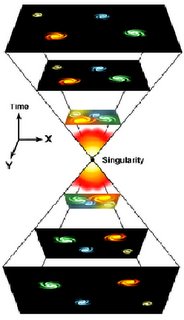Whatz prooved & Whats not :: A DEAD END SUPPLIMENT !
Hey all !
Hmm ...
Another Dead End ? Nope I'm saturated of those now. But this one's interesting enough to be brought to notice of the blog.
A seemingly remarkable proof indeed for prooving that all numbers are interesting !
But Can a subjectivity of the problem be discussed mathematically ? The answer seems to be yes !?!
Now lemme introduce you 2 a couple of DEAD ENDS :
(1)
To Proove : Every natural number N can be described within 15 words.
Assumption : Let there be a set S of number which cannot be expressed within 15 words.
Ordering the set S & pickig out the first element, say P we get P as :
P is the "the smallest natural number that cannot be unambiguously described in fifteen words or less".
:. P can be described within 15 words.
By Reductio Ad Absurdum ;
We herey proove the Statement that :
EVERY NUMBER CAN BE REPRESENTED WITHIN 15 WORDS.
(2)
I begin this one, relating to the THEOREM OF MATHEMATICAL INDUCTION as quoted by Arun in a comment to the previous post.
"
The principle of mathematical induction basically is a logical proof of extention. If you can show that:
1) The statement is true for the base case, i.e. 0 generally,
2) That if it is true for n, n-1, n-2, it IMPLIES truth for n+1.
"
Okay. Let there be a statement S(n) depending on n which can be either TRUE or FALSE.
I DEFINE S(n) as :
S(n): "In ANY group of 'n' blog-members, all have equal ages."
OR
"In a set of blog-members-ages from ANY particular blog, all values are equal."
Now proceeding on the lines of the above discussed theorem, lets discuss S(1).
: " In ANY group with 1 blog-member, All blog-members have equal ages ( Takin one member at a time since n = 1 )."
Clearly S(1) is TRUE.
Assume that S(k) is TRUE which implies that :
: " In ANY group of 'k' blog-members, all have equal ages."
Now to proove S(n) for all N belongs to (1,infinity), We must proove S(k+1).
So now we have a set of (k+1) blog-members. Of those, we can choose different combinations of 'k' blog members. In each of these combinations, all blog-members would have equal ages. Therefore, All blog-members in the (k+1) blog-member set are equal in age.
:. S(k+1) is TRUE if S(k) is TRUE.
S(1) is true. S(k+1) is TRUE When S(k) is TRUE.
:. by the THEOREM OF MATHEMATICAL INDUCTION ...
S(n) is TRUE.
Implying this for the blog KVPY2005 : Fused Bulbs... I hereby proove that all memebers in this blog are equal in age, which is conincidentally true within the limits of error. lol.
Ill leave the implications to be discussed by the blog members.
WAITING FOR COMMENTS
(desperately hehehe)
Twish




